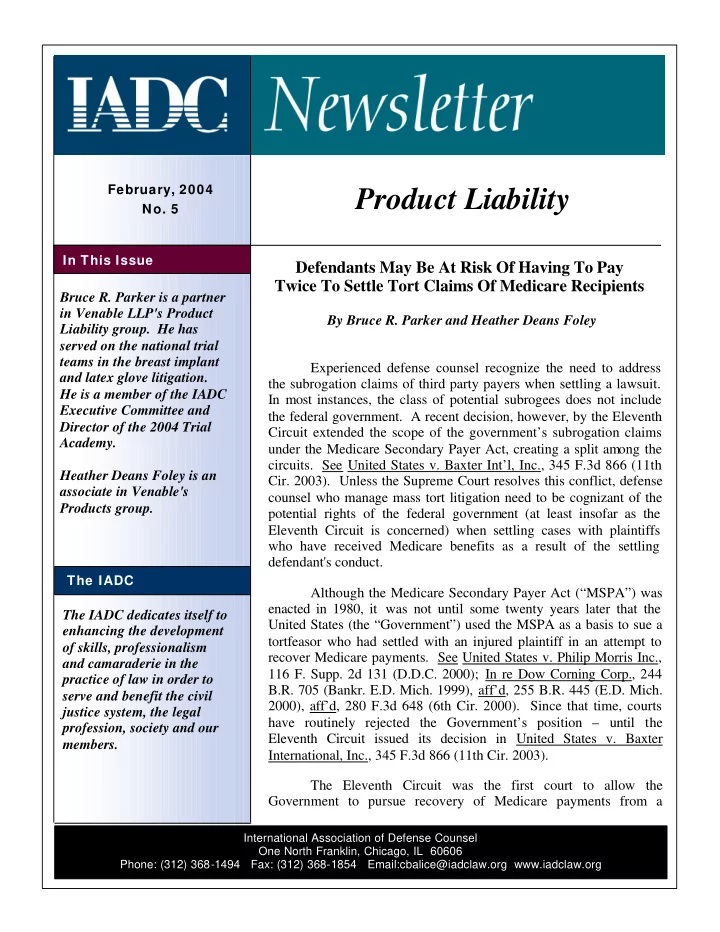

February, 2004 Product Liability No. 5 In This Issue Defendants May Be At Risk Of Having To Pay Twice To Settle Tort Claims Of Medicare Recipients Bruce R. Parker is a partner in Venable LLP's Product By Bruce R. Parker and Heather Deans Foley Liability group. He has served on the national trial teams in the breast implant Experienced defense counsel recognize the need to address and latex glove litigation. the subrogation claims of third party payers when settling a lawsuit. He is a member of the IADC In most instances, the class of potential subrogees does not include Executive Committee and the federal government. A recent decision, however, by the Eleventh Director of the 2004 Trial Circuit extended the scope of the government’s subrogation claims Academy. under the Medicare Secondary Payer Act, creating a split among the circuits. See United States v. Baxter Int’l, Inc., 345 F.3d 866 (11th Heather Deans Foley is an Cir. 2003). Unless the Supreme Court resolves this conflict, defense associate in Venable's counsel who manage mass tort litigation need to be cognizant of the Products group. potential rights of the federal government (at least insofar as the Eleventh Circuit is concerned) when settling cases with plaintiffs who have received Medicare benefits as a result of the settling defendant's conduct. The IADC Although the Medicare Secondary Payer Act (“MSPA”) was enacted in 1980, it was not until some twenty years later that the The IADC dedicates itself to United States (the “Government”) used the MSPA as a basis to sue a enhancing the development tortfeasor who had settled with an injured plaintiff in an attempt to of skills, professionalism recover Medicare payments. See United States v. Philip Morris Inc., and camaraderie in the 116 F. Supp. 2d 131 (D.D.C. 2000); In re Dow Corning Corp., 244 practice of law in order to B.R. 705 (Bankr. E.D. Mich. 1999), aff’d, 255 B.R. 445 (E.D. Mich. serve and benefit the civil 2000), aff’d, 280 F.3d 648 (6th Cir. 2000). Since that time, courts justice system, the legal have routinely rejected the Government’s position – until the profession, society and our Eleventh Circuit issued its decision in United States v. Baxter members. International, Inc., 345 F.3d 866 (11th Cir. 2003). The Eleventh Circuit was the first court to allow the Government to pursue recovery of Medicare payments from a International Association of Defense Counsel One North Franklin, Chicago, IL 60606 Phone: (312) 368-1494 Fax: (312) 368-1854 Email:cbalice@iadclaw.org www.iadclaw.org
Product Liability Committee New sletter product manufacturer who settled a lawsuit with …” the MSPA regulations. 42 U.S.C. an injured plaintiff. In so doing, the Eleventh § 1395y(b)(3)(A). Circuit went against a large body of case law and In relevant part, the regulations setting created a split among the circuits. This forth the means by which the Government, or the newsletter will explore the issues raised by the Centers for Medicare and Medicaid Services Eleventh Circuit’s decision, including its break (“CMS”), can assert an action to enforce the from previous federal court decisions and split MSPA provide for: from the Fifth Circuit. (i) Recovery from third The Medicare Secondary Payer Act parties. CMS has a direct right of action to recover The Medicare Secondary Payer Act is “a from any entity responsible collection of statutory provisions codified during for making primary the 1980s with the intention of reducing federal payment. This includes … health care costs.” United States v. Baxter Int’l, an insurance carrier, plan, Inc., 345 F.3d 866, 874 (11th Cir. 2003); see also or program, and a third 42 U.S.C. § 1395y(b) et seq. Prior to 1980, party administrator … Medicare paid for qualified medical services (ii) Recovery from parties that regardless of whether the individual was also receive third party covered by other health insurance. See Social payments. CMS has a right Security Amendments of 1965, Pub. L. No. 89- of action to recover its 97, § 1862(b), 79 Stat. 286. Beginning in 1980, payments from any entity, Congress decided to implement a series of cost including a beneficiary, cutting amendments, known as the Medicare provider, supplier, Secondary Payer Act, in order to recoup some of physician, attorney, state the skyrocketing costs associated with the agency, or private insurer Medicare system. See New York Life Ins. Co. that received a third party v. United States, 190 F.3d 1372, 1374 (Fed. Cir. payment. 1999); Zinman v. Shalala, 67 F.3d 841, 845 (9th (iii) Reimbursement to Cir. 1995); H.R. Rep. No. 96-1167, at 352 Medicare. If the (1980). beneficiary or other party receives a third party In order to accomplish its objective, the payment, the beneficiary or MSPA requires Medicare beneficiaries to other party must reimburse exhaust all coverage from private health plans Medicare within 60 days. before looking to Medicare for payment. Thus, (iv) Special rules. (1) In the primary responsibility for an individual’s case of liability insurance medical bills is assigned to private insurance, settlements … the while Medicare acts as the secondary payer following rule applies: If responsible only for the amounts not covered by Medicare is not reimbursed a primary plan. See United States v. Rhode as required by paragraph Island Insurers’ Insolvency Fund, 80 F.3d 616, (h) of this section, the third 618 (1st Cir. 1996); Blue Cross and Blue Shield party payer must reimburse of Texas, Inc. v. Shalala, 995 F.2d 70, 73 (5th Medicare even though it Cir. 1993). The statute allows for a private right has already reimbursed the of action with double damages if a primary plan beneficiary or other party. “fails to provide for privacy payment (or See 42 C.F.R. § 411.24(a), (b), (e), (g)-(i). appropriate reimbursement) in accordance with 2
Recommend
More recommend